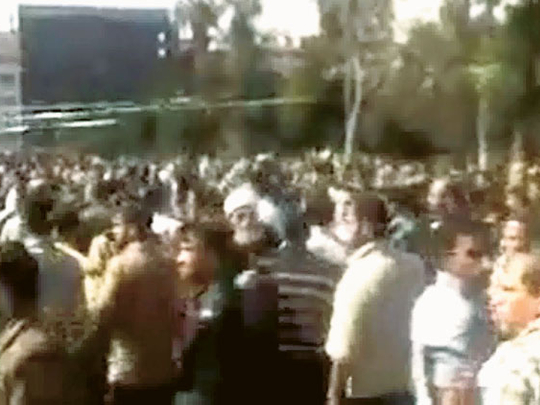
Dubai: March 15 could become another landmark date in the history of revolutions in the Arab world.
Syrians, inspired by the developments in Tunisia, Egypt, Libya and Yemen, took to the streets on that day in three major cities of their country and chanted slogans against the Al Assad regime — a luxury many of them have never had since the single-party regime came to power some five decades ago.
The protests started peacefully but turned violent when security forces killed four protesters in the southern city of Daraa.
The protesters were calling for an end to the 48-year rule of the Baath party along with the emergency law that came into force with it, and the 42-year rule of the Al Assad family.
Undercover activists
The campaign to mobilise protesters in the three cities — Daraa, Banias and Homs — gathered momentum after a 45-day campaign launched by a small number of undercover activists on Facebook.
The page which was launched under the name "Syrian Revolution 2011", garnered 58,793 supporters in less than a month.
"The techniques being used to mobilise protesters in Syria are very similar to those used in other Arab countries. The only difference is in the spark that ignited the flame in Syria. It was not an act of suicide as that committed by Mohammad Al Bouazizi in Tunisia, neither was it a death in police custody as that of Mustafa Al Saeed in Egypt," according to Eyad Al Hussain, a member of the Syrian Revolution 2011 on Facebook.
"Nor was the spark provided by an annual commemoration like that of the massacre of 1,200 prisoners in the Bu Sleem prison in Libya. The Syrian spark came from the children of the country."
Al Hussain told Gulf News that until mid-February this year, Syria seemed to be immune to the virus of "sweeping revolutions" in the Arab world.
"The ‘virus' has, however, hit the children of the country, who have proved to be the least immune group in this society," he said.
Al Hussain said the regime was counting on the pragmatic approach of adults towards political change in the country and the fact that Syrians appreciate the stability that has prevailed in their country since 1970.
Brutality fears
"The fear of the brutal hand of security forces that adults experienced in the '80s and '90s of the last century, and in 2003, was another deterrent against men and women taking to the streets to express their views," he said.
"Daraa children started it all. The boys, who shouted the slogans of the Egyptian and Yemeni revolutionaries in their classrooms — ‘People want to oust the regime' — were arrested by the security forces, starting the story of the Syrian revolution," Al Hussain said.
"The arrest of 30 children as young as 10 to 15 years old in the poor city of Daraa has ignited unrest in the whole country," he added.
"Parents, who were denied access to their children in custody, left the Omari mosque after Friday prayers on March 18 to march in the streets of the city chanting ‘God, Syria and liberty'," he added.
Excessive force slammed
Syrian human rights groups yesterday condemned the use of "excessive force" against protesters in the south of the country and called for those responsible to be held to account.
Eight groups slammed "the violent and unjustified behaviour of the security authorities who used excessive force to disperse a peaceful demonstration in Daraa, killing four and wounding dozens".
"This policy, pursued by the authorities to disperse several other demonstrations in Damascus, Homs and Banias, reflects their severity towards the peaceful civil-society movement", they said in a joint statement. "It also goes against the right to assembly guaranteed by the Syrian constitution and the government's commitments on human rights."












